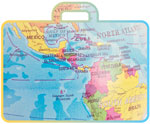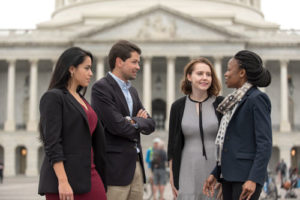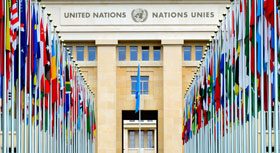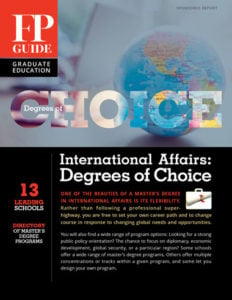2017 Graduate Education | International Affairs
THIS GUIDE IS NO LONGER ACTIVE. For the current FP Guide, click here.
International Affairs: Degrees of Choice

One of the beauties of a master’s degree in international affairs is its flexibility. Rather than following a professional superhighway, you are free to set your own career path and to change course in response to changing global needs and opportunities.
You will also find a wide range of program options: Looking for a strong public policy orientation? The chance to focus on diplomacy, economic development, global security, or a particular region? Some schools offer a wide range of master’s degree programs. Others offer multiple concentrations or tracks within a given program, and some let you design your own program.

Johns Hopkins University School of Advanced International Studies (SAIS) students outside the U.S. Capitol
We are living in rapidly changing times. “We expect continuing shifts in employment markets, particularly as opportunities in the public sector become more uncertain,” says Carmen Iezzi Mezzera, executive director of the Association of Professional Schools of International Affairs (APSIA). “That doesn’t necessarily mean government jobs are less desirable or that there will be fewer opportunities in the public sector, but we are not sure which areas will grow. No one knows what’s going to happen. This drives home the need for the kinds of transferable skills students acquire in international affairs programs.”
Organizations also need professionals with impact assessment skills: the ability to assess a situation, determine a response, and evaluate the outcome. NGO funding, via projects such as those supported by the Gates Foundation, is also increasingly subject to impact assessment.
Demand will continue to grow for professionals with statistical analysis, engineering, or other quantitative skills who also understand international affairs. “There are increasing opportunities to marry STEM skills with international affairs and be incredibly competitive,” says Mezzera.
Although cities like Washington, D.C., and New York will continue to be global affairs hubs, demand for global professionals is spreading geographically. Mezzera sees a growing relationship between highly local activity and global activity. “Cities and states have increasing demand for international affairs graduates,” she says. “Officials in Detroit, for example, are interested in professionals with a background in international trade and regional studies. They need people who can help market the city to attract international talent, tourists, and trade.”
Contents
- 2017 Graduate Education | International Affairs
- Association of Professional Schools of International Affairs (APSIA)
- The George Washington University, Elliott School of International Affairs
- New York University School of Professional Studies (NYUSPS), Center for Global Affairs (CGA)
- UC San Diego, School of Global Policy and Strategy (GPS)
- Georgetown University, Walsh School of Foreign Service (SFS)
- The Fletcher School of Law and Diplomacy at Tufts University
- Yale University, Jackson Institute for Global Affairs
- Seton Hall University, School of Diplomacy and International Relations
- Penn State School of International Affairs
- The New School, Graduate Program in International Affairs
- Boston University, Frederick S. Pardee School of Global Studies
- University of Minnesota, Humphrey School of Public Affairs
- University of Denver, Josef Korbel School of International Studies
- Johns Hopkins University, School of Advanced International Studies (SAIS)
- SOAS University of London
- University of Kent, Brussels School of International Studies (BSIS)
- Fordham University, Graduate Program in International Political Economy and Development (IPED)
- The University of Texas at Austin, Lyndon B. Johnson School of Public Affairs
- Syracuse University, Maxwell School of Citizenship and Public Affairs
Visit the Request Info page to receive information from the schools





